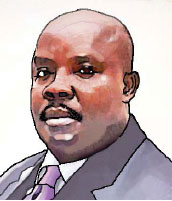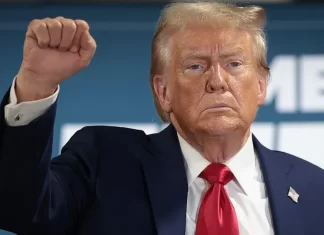By Emeka Alex Duru (08054103327)
Whether you are among the so-called hailers or haters of President Muhammadu Buhari, you cannot dispute the fact that he is currently under stress. Aside being a candidate in an election that has drawn insinuations from the people and presiding over an entity that has further drifted on major indices of development, the controversies surrounding the botched presidential and national elections last Saturday, February 16, are enough to upset him.
Riding on the wings of an election that was adjudged relatively free and fair, in 2015, Buhari had enjoyed enormous goodwill from Nigerians and other lovers of democracy around the world. The unusual concession of victory to him by the then President Goodluck Jonathan, added to the seal of integrity that Buhari has leveraged on, ever since. It was therefore, not strange that the same observers who hailed the election that brought the President to power, would expect similar seamless exercise, even if he was a candidate. On account of this, the Independent National Electoral Commission (1NEC), was provided with adequate materials and resources needed for exercise. Neither the agency nor any of its officials, has at least, complained of being starved of funds. Rather, on occasions when its chairman, Professor Yakubu Mahmood and other officers of the Commission had spoken on their readiness for the poll, they had carried on as being on top of their game.
But on the day it mattered most, INEC failed to rise to the occasion. With a hurried press statement pushed out to Nigerians at the early hours of the day, it announced the postponement of the election to Saturday, February 23. It claimed logistic challenges as reasons for the shift. That of the governors and state houses of assembly, was also moved from the original March 2 date to March 9. Nigerians did not find the entire thing funny. Neither did Buhari. For him, it was a personal loss – failure of sort on the part of his administration for not being able to conduct a transparent election on a scheduled date. Added to the allegations and counter allegations of sabotage and other untoward actions behind the postponement, the President understandably, finds himself in a mess.
It was perhaps, against the backdrop of guarding against a repeat of the shame of last Saturday, that an obviously incensed Buhari announced that he had directed the military to deal ruthlessly with any person compromising the rescheduled poll, particularly ballot snatchers. For a system that has been battling with flawed electoral process in its political history, violence, manipulation of figures, bribery and ballot box snatching have been identified among the vices working against attainment of enduring democracy in the land.
The President, as most concerned Nigerians, may not have been at ease with the ugly trends. Taken on the face value, therefore, his marching orders to the soldiers, may have been in attempt to scare miscreants from the polling centres. Of course, even before now, Buhari had not failed to dramatise his love for Nigeria. Back in 1984, as Military Head of State, he had reminded Nigerians that this generation and indeed future generations had no other country except Nigeria and should stay behind to salvage it. The statement which he made to discourage young men and women from leaving the country in search of greener pasture abroad, turned out to be a clarion call for all hands to be on the deck for a better Nigeria. Even now as a civilian president, he has often reminded his critics how he trekked long distances for days during the civil war in efforts to keep the country one.
He can thus, be said to have paid his dues in the Nigeria Project, in some measures. These, ordinarily, can earn him some levels of entitlement in putting up suggestions that can strengthen the culture of democracy in the land. We may then begin to understand and appreciate the sentiments behind his directives against ballot box snatchers. Or so they seemed.
But where he however got the directive mixed up, is in issuing the order in isolation to other factors working against the growth and entrenchment of democracy in the country. For one, ballot box snatching as a form of rigging, has been as old as the country. But over time, it is no longer a regular practice in vote rigging. And the President knows or should know. In place of snatching the ballot boxes, newer trends as inflation of figures, falsification of results, under-aged voting, bribery and purchase of voters’ cards are in vogue, currently. In the election that brought him to power four years ago, the President benefitted from some, if not all of these antics. He may not have commissioned anyone to do so for him. But his supporters and foot soldiers may have done so for him at one point or another.
All the same, realizing, albeit belatedly that any of them is bad, is quite commendable. But the manner with which it is to be dealt with is what matters most. Late President Umaru Yar’Adua, on coming to power in 2007, was gracious enough to admit that the process through which he was elected was flawed and made moves to reform the system but could not live long enough to see it through. Buhari cannot, in all honesty, claim not to have known that the process that threw him up was faulty at some points and needed to be refined for better results. He has not done so. That he suddenly woke up, few days to the rescheduled presidential poll, to issue the order against ballot box snatchers, clearly against the laws of the land, has reasons to give concern to many. The other time he issued such a blanket directive to soldiers against members of the Indigenous Peoples of Biafra (IPOB) – an unarmed group that was merely seeking a separate state of Biafra – the consequences were severe. Besides visiting the peaceful IPOB protesters with the full might of military arsenals, the overzealous soldiers went beyond their brief, equally mowing down non-members of the group. The pains of those dastardly operations linger in many families and communities in the South East.
In the instant case, with allegations of partisanship against the military by interest groups, a distinction between a ballot snatcher and an innocent voter who must have been felled by a misguided trigger-happy security personnel, can only be made by the person sending the soldiers on the sordid errand. It is, thus, a case of one acting as a Judge in his own case. That is against natural justice. It exudes intimidation to opponents of the president or his party. It can even compromise the election. That is the problem with the President’s directive.













